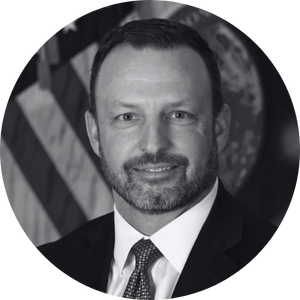Agenda
Times are subject to change.
Welcome to the 2025 Defense One Tech Summit!
Welcome to the 2025 Defense One Tech Summit!

Frank Konkel
Editor-in-ChiefGovernment Executive


AI and autonomous systems are revolutionizing the battlefield, accelerating the pace of warfare and reshaping military decision-making. From AI-powered weapons and autonomous drones to predictive algorithms, these technologies are enhancing speed, precision, and effectiveness in combat. However, their rapid adoption raises crucial questions about ethics, accountability, and control. This panel will explore how AI-driven autonomy is transforming modern warfare, examining its role in real-time decision-making and its implications for global defense strategies. Experts will discuss the operational impact of autonomous systems, the risks they pose, and how militaries can ensure these technologies are used responsibly and within the bounds of international law.
AI and autonomous systems are revolutionizing the battlefield, accelerating the pace of warfare and reshaping military decision-making. From AI-powered weapons and autonomous drones to predictive algorithms, these technologies are enhancing speed, precision, and effectiveness in combat. However, their rapid adoption raises crucial questions about ethics, accountability, and control. This panel will explore how AI-driven autonomy is transforming modern warfare, examining its role in real-time decision-making and its implications for global defense strategies. Experts will discuss the operational impact of autonomous systems, the risks they pose, and how militaries can ensure these technologies are used responsibly and within the bounds of international law.

Dani Gibbons
Government Applications LeadPrimordial Labs

David Payne
Director, Replicator 2 & Program Manager, Strategic InitiativesDIU

Trey Treadwell
Associate Director for CapabilitiesNational Geospatial-Intelligence Agency

Brandon Tseng
Co-Founder & PresidentShield AI

Patrick Tucker
Science & Technology EditorDefense One
Fraud as a Battlefield: Identity Verification in the Age of Digital Adversaries


As digital systems become the backbone of government operations, identity fraud has evolved from a nuisance into a national security threat. In this short session, Socure’s Jordan Burris joins moderator Robert Shea to unpack key findings from Socure’s recent Fraud in Focus report—research that exposed how international fraud rings, including actors linked to China and Russia, are systematically targeting U.S. government programs. The discussion will explore how identity verification has become a strategic imperative in defending against organized digital attacks that erode trust, disrupt benefits, and compromise mission-critical systems. Attendees will leave with a clear message: if you think your agency is immune to fraud, you're probably not looking hard enough.
Elite Underwriter Session sponsored by Socure
As digital systems become the backbone of government operations, identity fraud has evolved from a nuisance into a national security threat. In this short session, Socure’s Jordan Burris joins moderator Robert Shea to unpack key findings from Socure’s recent Fraud in Focus report—research that exposed how international fraud rings, including actors linked to China and Russia, are systematically targeting U.S. government programs. The discussion will explore how identity verification has become a strategic imperative in defending against organized digital attacks that erode trust, disrupt benefits, and compromise mission-critical systems. Attendees will leave with a clear message: if you think your agency is immune to fraud, you're probably not looking hard enough.
Read More
Jordan Burris
Head of Public SectorSocure

Robert Shea
Chief Executive OfficerGovNavigators
Artificial intelligence is reshaping how governments operate—and how nations compete. This panel features senior executives from leading AI and cloud firms to explore how advanced AI tools are boosting U.S. government efficiency, enabling faster decision-making, and becoming central to global power competition. What barriers remain to adoption? How can public-private partnerships accelerate secure, ethical deployment? And what’s at stake if the U.S. loses its AI edge?
Artificial intelligence is reshaping how governments operate—and how nations compete. This panel features senior executives from leading AI and cloud firms to explore how advanced AI tools are boosting U.S. government efficiency, enabling faster decision-making, and becoming central to global power competition. What barriers remain to adoption? How can public-private partnerships accelerate secure, ethical deployment? And what’s at stake if the U.S. loses its AI edge?

Troy Demmer
Co-Founder and PresidentGecko Robotics

Peter Guerra
Group Vice President, AI & DataOracle

Katrina Mulligan
Head of National SecurityOpenAI for Government

Leigh Palmer
Vice President, Technology Strategy & DeliveryGoogle Public Sector

Lauren Williams
Senior EditorDefense One
Vehicle intelligence is the next frontier of AI—embodied, multimodal, and deeply integrated into physical systems across all defense domains. From autonomous convoys to drones and ground robots, this is where Silicon Valley-grade innovation meets dual-use mission impact, enabling warfighters to outpace threats with AI that perceives, understands, and adapts in real time.
Elite Underwriter Session sponsored by Applied Intuition
Vehicle intelligence is the next frontier of AI—embodied, multimodal, and deeply integrated into physical systems across all defense domains. From autonomous convoys to drones and ground robots, this is where Silicon Valley-grade innovation meets dual-use mission impact, enabling warfighters to outpace threats with AI that perceives, understands, and adapts in real time.
Read More
Jason M. Brown
General Manager - DefenseApplied Intuition

Courtney O'Neal-Allen
Director of Content, GovExec EventsGovExec
The commercialization of space has dramatically reduced the cost of access to orbit, transforming both the space industry and military strategy. With new opportunities for satellite deployments, communication, and surveillance, the space domain is becoming a critical theater for defense operations. This panel will explore how affordable space access is reshaping military strategy, from enhancing real-time intelligence and communication to strengthening national security. Experts will discuss the implications of this new space race, focusing on the challenges, opportunities, and strategic shifts needed to stay ahead in a rapidly evolving space environment.
The commercialization of space has dramatically reduced the cost of access to orbit, transforming both the space industry and military strategy. With new opportunities for satellite deployments, communication, and surveillance, the space domain is becoming a critical theater for defense operations. This panel will explore how affordable space access is reshaping military strategy, from enhancing real-time intelligence and communication to strengthening national security. Experts will discuss the implications of this new space race, focusing on the challenges, opportunities, and strategic shifts needed to stay ahead in a rapidly evolving space environment.

Derek M. Tournear, Ph.D.
DirectorSpace Development Agency

Bill Vass
CTOBooz Allen

Frank Konkel
Editor-in-ChiefGovernment Executive

Bruno Mahlmann
Director, Business Development – Intelligence CommunitySplunk
As Principal Deputy CIO of the Department of Defense, Leslie Beavers oversees one of the most complex and mission-critical IT enterprises in the world. In today’s landscape of digital-first warfare, where speed, resilience, and secure data access are paramount, outdated systems and sluggish acquisition cycles are no longer acceptable. From AI-enabled decision-making to zero-trust architecture and cloud-based operations, DoD must continuously modernize to maintain its strategic edge. In this keynote, Beavers will share her vision for driving digital transformation at scale—advancing interoperability, accelerating innovation, streamlining IT governance, and cultivating a cyber-ready workforce. She’ll outline how the DoD CIO office is enabling operational advantage through technology at the pace of mission need.
As Principal Deputy CIO of the Department of Defense, Leslie Beavers oversees one of the most complex and mission-critical IT enterprises in the world. In today’s landscape of digital-first warfare, where speed, resilience, and secure data access are paramount, outdated systems and sluggish acquisition cycles are no longer acceptable. From AI-enabled decision-making to zero-trust architecture and cloud-based operations, DoD must continuously modernize to maintain its strategic edge. In this keynote, Beavers will share her vision for driving digital transformation at scale—advancing interoperability, accelerating innovation, streamlining IT governance, and cultivating a cyber-ready workforce. She’ll outline how the DoD CIO office is enabling operational advantage through technology at the pace of mission need.

Leslie Beavers
Principal Deputy CIODepartment of Defense

Frank Konkel
Editor-in-ChiefGovernment Executive
Artificial intelligence is transforming what defense agencies are able to accomplish, from enhancing collaboration, streamlining data delivery and extracting insights, and accelerating mission delivery. What should technology leaders keep in mind as they navigate AI adoption? During this session, Google Public Sector’s Ahmed Ali will share best practices for AI implementation and examples of how AI is already driving innovation across agencies today.
Elite Underwriter Session sponsored by Google
Artificial intelligence is transforming what defense agencies are able to accomplish, from enhancing collaboration, streamlining data delivery and extracting insights, and accelerating mission delivery. What should technology leaders keep in mind as they navigate AI adoption? During this session, Google Public Sector’s Ahmed Ali will share best practices for AI implementation and examples of how AI is already driving innovation across agencies today.
Read More
Ahmed Ali
Key Account Lead, Defense and National SecurityGoogle Public Sector

Constance Sayers
PresidentGovExec
Join Defense One’s Patrick Tucker for a one-on-one conversation with Chris Brose, Chief Strategy Officer at Anduril Industries. From the Pentagon’s Replicator initiative to Anduril’s billion-dollar manufacturing push, Brose has been at the forefront of reshaping how the U.S. builds and buys defense tech. He’ll share insights on accelerating innovation, overcoming procurement bottlenecks, and why the next decade is critical to maintaining America’s military edge.
Join Defense One’s Patrick Tucker for a one-on-one conversation with Chris Brose, Chief Strategy Officer at Anduril Industries. From the Pentagon’s Replicator initiative to Anduril’s billion-dollar manufacturing push, Brose has been at the forefront of reshaping how the U.S. builds and buys defense tech. He’ll share insights on accelerating innovation, overcoming procurement bottlenecks, and why the next decade is critical to maintaining America’s military edge.

Christian Brose
President and Chief Strategy OfficerAnduril Industries

Patrick Tucker
Science & Technology EditorDefense One
NIST Special Publication 800-207 does a great job defining Zero Trust and its many
different paraments. Most people discuss Identity Management or Software controls and
protection in their discussions. The implementation of hardware controls combined with
software protections at the edge is a large part of zero trust. Hear how the
hardware/firmware side can work closely with software in implementing a zero trust plan
for DoD.
NIST Special Publication 800-207 does a great job defining Zero Trust and its many
different paraments. Most people discuss Identity Management or Software controls and
protection in their discussions. The implementation of hardware controls combined with
software protections at the edge is a large part of zero trust. Hear how the
hardware/firmware side can work closely with software in implementing a zero trust plan
for DoD.

Tommy Gardner
CTOHP Federal


Hypersonic weapons, advanced interceptors, and air-breathing strike systems are redefining the future of missile defense and deterrence. As these technologies evolve, they offer powerful new capabilities to counter emerging threats and maintain strategic superiority. A key part of this shift is the Pentagon’s Golden Dome initiative, a multi-layered missile defense architecture designed to protect the U.S. homeland from ballistic, cruise, and hypersonic missiles. This panel will examine how programs like Golden Dome, combined with next-generation sensors, AI-driven decision-making, and advanced strike systems, are shaping the next era of deterrence. Experts will explore the impact of these developments on global security, defense strategy, and the ability to maintain a military edge in an increasingly complex threat environment.
Hypersonic weapons, advanced interceptors, and air-breathing strike systems are redefining the future of missile defense and deterrence. As these technologies evolve, they offer powerful new capabilities to counter emerging threats and maintain strategic superiority. A key part of this shift is the Pentagon’s Golden Dome initiative, a multi-layered missile defense architecture designed to protect the U.S. homeland from ballistic, cruise, and hypersonic missiles. This panel will examine how programs like Golden Dome, combined with next-generation sensors, AI-driven decision-making, and advanced strike systems, are shaping the next era of deterrence. Experts will explore the impact of these developments on global security, defense strategy, and the ability to maintain a military edge in an increasingly complex threat environment.

Masao Dahlgren
Fellow, Missile Defense ProjectCSIS

Doug Loverro
PresidentLoverro Consulting

Major General Mark Piper
Deputy Director of OperationsNorth American Aerospace Defense Command (NORAD)

Patrick Tucker
Science & Technology EditorDefense One
The Arctic, above 65 degrees Latitude (to 90/north pole) is where problems start – satellite coverage is very limited in this area compared to lower latitudes, used for primary decision making. Environmental exposure in the north can be deadly -40 to -60 operational temperatures are common. For conducting expeditionary or large scale combat operations (paramount in the Arctic) critical information sources are severely degraded. Multidomain, precision enabled, combined arms warfare -the measure of military success - is severely degraded with lack of tools, and technology that doesn’t work in the Arctic.
Elite Underwriter Session sponsored by Red Hat
The Arctic, above 65 degrees Latitude (to 90/north pole) is where problems start – satellite coverage is very limited in this area compared to lower latitudes, used for primary decision making. Environmental exposure in the north can be deadly -40 to -60 operational temperatures are common. For conducting expeditionary or large scale combat operations (paramount in the Arctic) critical information sources are severely degraded. Multidomain, precision enabled, combined arms warfare -the measure of military success - is severely degraded with lack of tools, and technology that doesn’t work in the Arctic.
Elite Underwriter Session sponsored by Red Hat

Stephen Gordon
Director, Strategic Accounts, DOD / Missiles & SpaceRed Hat

Troy Bouffard
Director - Center for Arctic Security and ResilienceUniversity of Alaska, Fairbanks

Anna Pettyjohn
EVP, Product & StrategyGovExec


The Defense Department’s relationship with Silicon Valley has evolved to the point where defense leaders expect new tech to come from companies they may not have heard of before. Add in the rise in billionaire and venture-capital backed defense companies and the Pentagon’s Office of Strategic Capital, which offers loans to companies in key tech areas like microelectronics, and there’s a recipe for fierce competition to solve tough national security problems. This panel will discuss the changing tides of defense tech investing, policy barriers, the potential for high margin returns, the effects of ongoing conflicts like Russia’s war on Ukraine, the future of the sector and who is set to become the next Anduril or Palantir.
The Defense Department’s relationship with Silicon Valley has evolved to the point where defense leaders expect new tech to come from companies they may not have heard of before. Add in the rise in billionaire and venture-capital backed defense companies and the Pentagon’s Office of Strategic Capital, which offers loans to companies in key tech areas like microelectronics, and there’s a recipe for fierce competition to solve tough national security problems. This panel will discuss the changing tides of defense tech investing, policy barriers, the potential for high margin returns, the effects of ongoing conflicts like Russia’s war on Ukraine, the future of the sector and who is set to become the next Anduril or Palantir.

Susanne Hake
General Manager, U.S. Government BusinessMaxar Intelligence

Greg Little
Senior CounselorPalantir Technologies

Sarah Pearson
Director of Commercial EngagementDefense Innovation Unit (DIU)

David Rothzeid
Principal InvestorShield Capital

Lauren Williams
Senior EditorDefense One
Join us with complimentary refreshments as you take advantage of this final opportunity to build lasting connections with your peers.
Reception Compliments of Swish
Join us with complimentary refreshments as you take advantage of this final opportunity to build lasting connections with your peers.
Reception Compliments of Swish

Sean Applegate
Chief Technology OfficerSwish


